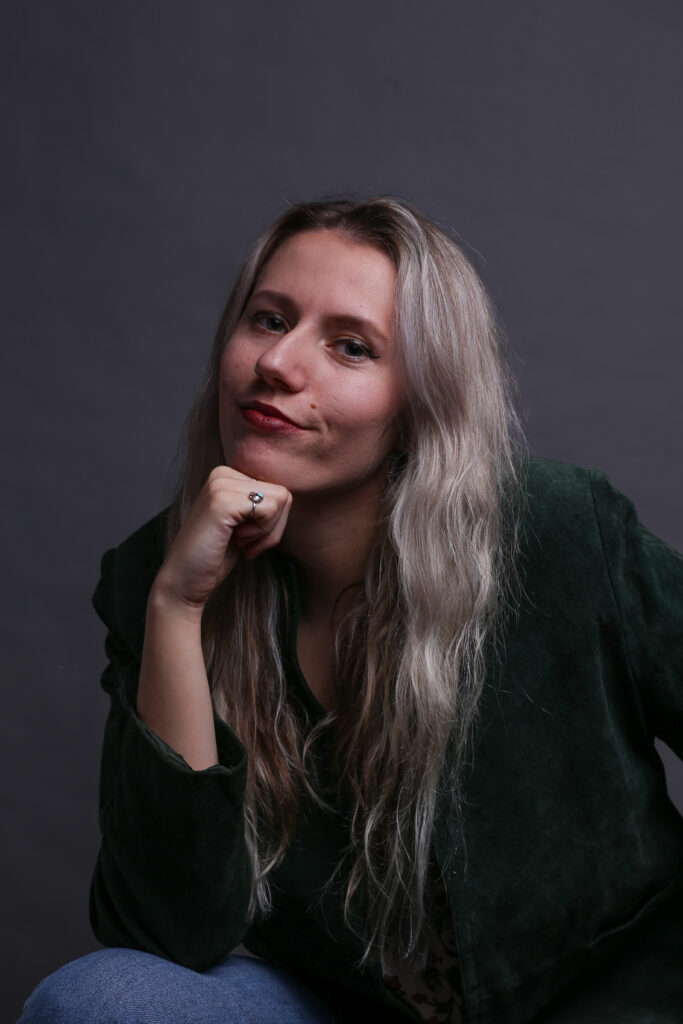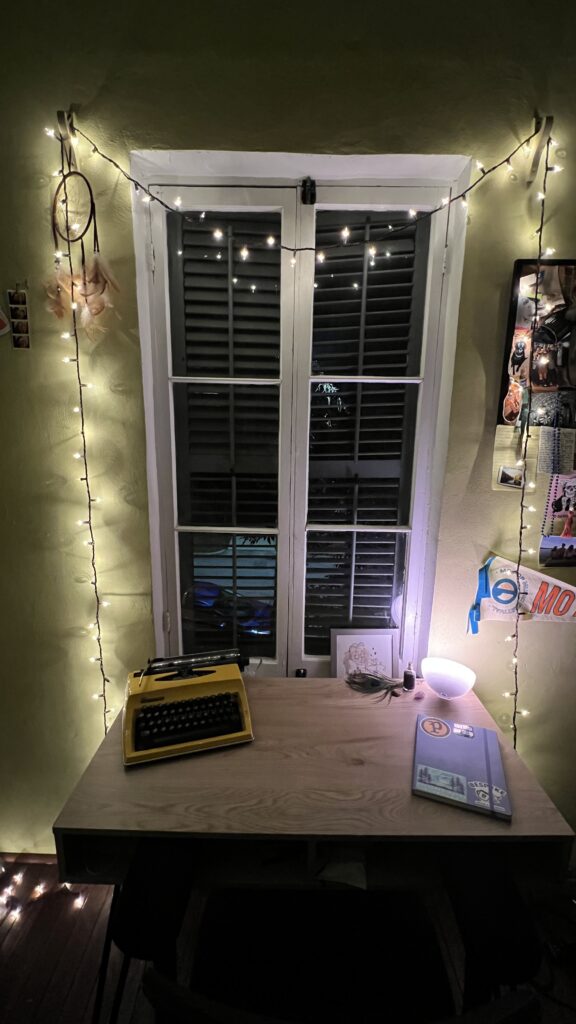
Ryleigh Wann (she/her) is an MFA candidate at UNC Wilmington, where she teaches and writes poetry. Ryleigh is also the comics editor for Ecotone and the music editor for Flypaper Lit. Her writing can be found in Rejection Letters, Kissing Dynamite Poetry, Flypaper Lit, and elsewhere. Keep up with her on Twitter @wannderfullll
Click here to read Ryleigh’s hybrid piece “Praise”
from our winter 2022 Joy issue!
Does your writing ever surprise you? In what ways?
As a poet who is flirting with prose, I continue to be surprised with discovery through writing and revising — the discovery being I always seem to be writing about the same thing. I think I’m going to write about a cicada, and then somehow find myself writing about the same concept that I’ve been chewing on for years, whether it be my relationship with my mother or a memory associated with Michigan (I guess that’s my triggering town). Lately, I’m obsessed with the balance of grief and desire, and it just keeps showing up, even in the weird fiction or nonfiction I’ve been toying with — all of which are still very poetic.
What part of the writing process brings you the most joy?
When I’m revising a poem I haven’t touched in a few years and finally have that lightning strike moment when I’m like Oh!! This is what needs to be happening here! And then suddenly it all starts to flow and mesh together in a way that makes the first draft feel absolutely chaotic. That brings a burst of joy, every time.
How do you preserve that joy in your writing in the face of rejections or setbacks?
Rejections are a drag, and encouraging declines are almost worse — I’ve found if the piece wasn’t a good fit for that specific journal, and as long as the piece wasn’t sent out prematurely, I aim to send the poem to at least one other journal for each rejection I get. Or I treat myself in some fashion, with either a walk around the lake, buying my favorite snack (Funyuns), or reading a favorite poem of mine (lately, it’s been Franny Choi’s “Perihelion: A History of Touch”). It’s a good reminder to be gentle with myself.
Do you have a specific revision process?
I think looking at a poem in every possible way often leads to exciting revisions. I’ll try to double the length or cut it in half, or rewrite it from memory or use a different point of view. I also tend to have a bad habit of competing images, so I’m always thinking about the relationships between lines and which best serve the piece, and what the poem loses if a specific line is cut — if the answer is nothing, I’ll probably cut that line. If I’m obsessed with a piece, I try to not sit on it — although maybe I should. I feel like if there is heat to something I’ll continue to stoke it, especially if I’m excited by it. I rarely share drafts unless I’m really, really stuck on something, whether it be deciding between forms or which ending feels best. I know it’s ready for submission when every line seems to be doing something for the piece.
Writing is most often a labor of love, where gratification is self-defined and can sometimes be delayed or subdued. What motivates you to keep coming back to the page?
My motivation to return to the page is the belief that poetry is magic. Poets are often truth tellers, and it’s all I can do to keep from scratching my skin away. If I don’t keep writing, I’m afraid I’ll swell into oblivion with my confessions trapped inside.
Do you think a writer’s nerves or anxieties about their work can positively affect it?
I think at times it might be good, but also can negatively impact it. If one overthinks or has imposter syndrome, and that anxiety can lead to overediting a piece of writing, it might lose its essence or original voice. If a writer’s nerves about their work leads to editing a piece in hopes that a specific publication might like it more, it could lose some aspect of truth. However, if the nerves lead to better work being done under pressure, then hey, more power to them. I think it’s a question of balance at the end of the day.
Rest is arguably as important as getting the words down, especially when we can give our brains a true rest and let them wander as they wish. What do you do to embrace this time and honor it as a space for regeneration, imagination, and possibility?
Anyone who knows me will admit that I am a very social person. I recharge by being around people and am an absolute unit of fire energy. I think living is an important part of the writing process, and as someone whose work is very confessional, I need those breaks to continue to write. I let my brain and body rest by spending time outside — roller skating, biking, or walking along the Riverwalk downtown. I’m lucky to live somewhere with a temperature that is typically warm. If I’m not embracing time and space from my words, the words are no good.
If you have a regular writing practice, what do you do to protect your writing time?
Boundaries, boundaries, boundaries. It’s difficult for me to write in the afternoon or evenings, so I try to fit a bulk of that into the morning. As someone who is easily distracted, I have to silence my phone to protect my writing time.
Where do you write? Do you have any rituals you follow before turning to the page?

Each morning during the week, I pour coffee into one of my eccentric mugs and read for at least thirty minutes while letting my pet rat roam around on the couch with me. After that, I’m fully awake and spend the late morning or early afternoon writing or editing. I write at my desk, and will either write in a notebook or on my typewriter before transferring it to my laptop.
What conversations do you hope your writing might spark for readers?
My manuscript focuses on an alter ego character named “Swamp Girl” and is meant to be a coming-of-age series through a surreal yet confessional lens. This character was used as a means to write about difficult events from my personal life in a setting that seemed drastically different from the cold, Midwestern state I grew up in. While my poetry about this specific character was once the main focus of my writing, I have since discovered new interests like ecopoetics and the relationship between addiction, grief, and desire. What has remained is how my writing continues to marvel at the glory of the ugly-beautiful. I hope it can spark conversations that involve self-reflection or an examination of how we interact with the more-than-human world.
Who is one writer you wish more people would read?
I think everyone should read Amy Gerstler. I named my pet rat after her collection Nerve Storm.
What’s the best bit of craft advice you’ve been given, or some of your own that you’d like to share? Are there any craft books you’d recommend?
The best bit of craft advice I’ve been given was from a mentor during my college years who told me “poetry isn’t a creativity contest, it’s an honesty contest.” Also, the advice that is commonly given but so important is to simply read more. Reading will only ever improve your own craft. For craft books, I love Tony Hoagland’s Real Sofistikashun and Meander, Spiral, Explode by Jane Alison.
What words of kindness, support, or advice can you offer to writers who are just starting out or seeking their stride?
Writing can feel like you’re shouting into the middle of the woods to an audience of no one. I suggest finding other writers who lift you up and make you feel saturated with light. They’ll make you feel excited to keep digging into your own craft and will push you to challenge yourself.
Any good news you’d like to end with?
I’m the new comics editor for Ecotone, as well as the music editor for Flypaper Lit, and I’d love to read your music essays, album reviews, etc. I’ve also recently updated my website, ryleighwann.com and I’m typically tweeting about jokes only I laugh at, or opossum photos on Twitter @wannderfullll
